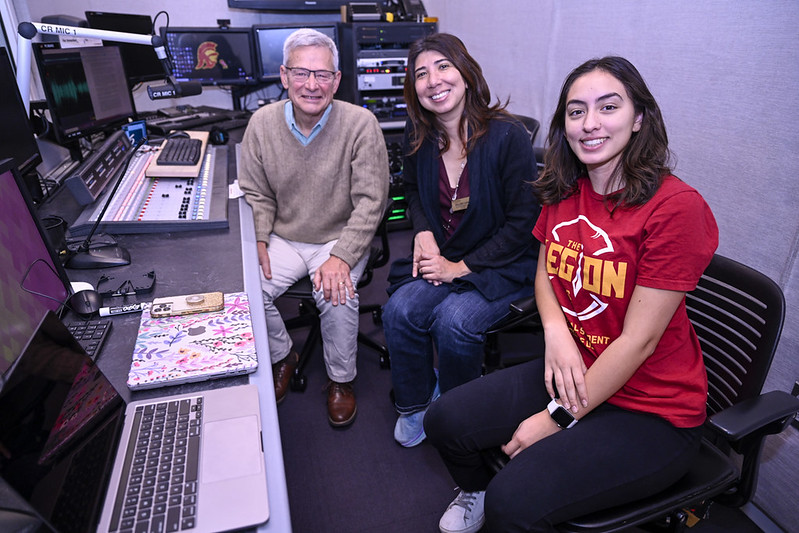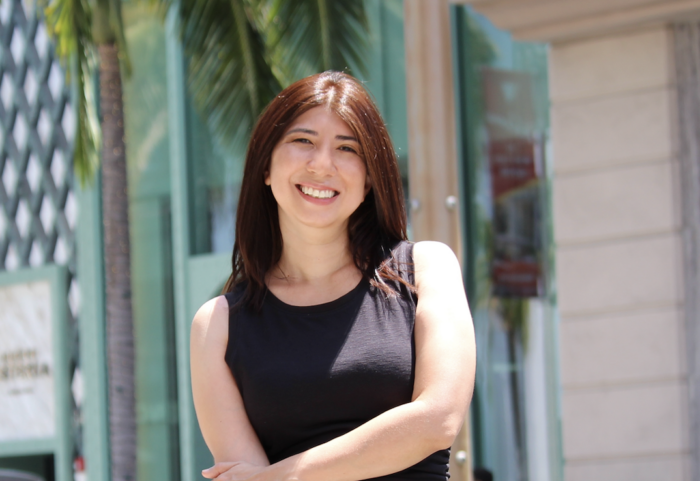Meet Mallory Carra: a journalist and podcast expert turning words into worlds, and now the driving force behind our newest podcast series “Electric Futures.” Through this work that challenges how we think about the clean energy transition, Mallory explores how to tell climate stories differently, in ways that engage and connect us.
For the past 2 years, Carra has been coaching Annenberg Radio News and Annenberg Media’s first AAPI vertical, elevASIAN, while working with Spotify on their podcasts, including other sustainability initiatives. This series, therefore, also represents a significant shift in her professional path, from covering small community events in her early career to bringing vital discussions about our planet’s future to the forefront.
Q. Mallory, your journey into journalism is quite diverse. Can you share how it all started?
I was an only child, so I depended a lot on my imagination. When I was younger, growing up in Queens, I wanted to be a lot of things: astronaut, scientist, teacher. But I later realized it was because I wanted to be a writer.
I would emulate big magazines like Entertainment Weekly and tell my parents stories. Then in high school, my friend convinced me to write for the school paper and I loved it – I felt like I had to tell other people’s nuanced stories before I could truly tell my own. This led me to study journalism at NYU, where I honed my skills and embraced diverse storytelling opportunities.
Q. What were the initial steps after graduating from NYU? How did you get to USC?
I took a chance at age 22 and moved to Tennessee. At the Chattanooga Times Free Press, I covered everything from small community events to major local happenings. Each story added a unique lesson to apply to my storytelling capabilities.
I worked my way up that ladder and wanted another adventure, so I applied to the film school here at USC and was accepted into their Cinematic Screenwriting Graduate Program, where I learned effective and compelling dialogue, script structures and more. Now, storytelling blends an art with a science for me and it feels like I’m solving a math problem.
Later, I started telling important stories with Spotify and other freelance journalists, which ultimately led me here to the Annenberg Media Center.
Q. Describe that transition to podcasting and specifically climate storytelling.
I think my transition to podcasting reflects the evolving landscape of media, where digital platforms are becoming pivotal in driving impactful narratives, especially around critical issues like climate change. My foray into this space came through an alumni connection from the screenwriting program. It started with a freelance opportunity, which eventually led me to become an editor at Bustle and later at Spotify.
My interest in science, which was nurtured at Spotify, coincided with the company’s initiative on climate change and sustainability. I had the opportunity to work on Earth Day specials, focusing on climate issues network-wide, including an episode on Karen Silkwood. My colleague Adam De Silva and now mentor Allison Agsten were instrumental in this transition, helping me apply my storytelling skills to the nuanced and critical subject of climate change. It’s about communicating complex scientific concepts in an engaging, personable, accessible manner.
Q. What are you most looking forward to about the new “Electric Futures” podcast?
“Electric Futures” represents a new approach to climate storytelling. It is a narrative-focused exploration of climate change, particularly in its coverage of the Imperial Valley – a region seldom discussed in mainstream media.
We’re transporting listeners to different places and times, introducing them to the lives and stories of local communities. By presenting these stories through the eyes of the community, it highlights our commonalities, bridging gaps in understanding and empathy.
In a world where climate change is often discussed in abstract terms, ”Electric Futures” brings a much needed human dimension to the dialogue. I think people will find they have a lot more in common with folks in Imperial Valley than they think.
This interview has been edited for length and clarity.

Chip Zukoski, Mallory Carra, and Natalie Lopez in the studio.
Michael Kittilson works as a Research Assistant at the Center for Climate Journalism and Communication.
